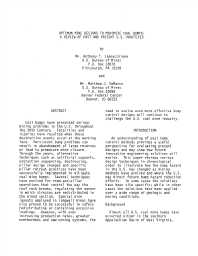Mining Publication: Optimum Mine Designs to Minimize Coal Bumps: A Review of Past and Present U.S. Practices
Original creation date: February 1992
Coal bumps have presented serious mining problems in the United States throughout the 20th century. Fatalities and injuries have resulted when these destructive events occur at the working face. Persistent bump problems can result in abandonment of large reserves or lead to premature mine closure. Through the years, alternative techniques such as artificial supports, extraction sequencing, destressing, pillar design changes, and specific pillar retreat practices have been successfully implemented to mitigate coal mine bumps. Several techniques have evolved for room-and-pillar operations that control the way the roof rock breaks, regulating the manner in which stresses are redistributed in the mined section. Special mine layouts employed in longwall mines have also proved to be successful in safely redistributing or containing excessive loadings. However, with ever-increasing production rates, greater overburdens, and new mining systems, the need to evolve even more effective bump control designs will continue to challenge the U.S. coal industry.
Authors: AT Iannacchione, MJ DeMarco
Book Chapter - February 1992
NIOSHTIC2 Number: 10011291
New Technology in Mining Health & Safety: Proceedings of the Symposium held at the SME Annual Meeting, Phoenix, Arizona, February 24-27, 1992. Khair AW, ed., Littleton, CO: Society for Mining, Metallurgy, and Exploration, 1992 Feb; :235-247
See Also
- Coal Mine Burst Prevention Controls
- Deep Cover Pillar Recovery in the US
- Diagnosing and Controlling Moisture-Sensitive Roof in Coal Mines
- The Effects of Roof and Floor Interface Slip on Coal Pillar Behavior
- A Hybrid Statistical-Analytical Method for assessing Violent Failure in U.S. Coal Mines
- Occurrence and Remediation of Coal Mine Bumps: A Historical Review
- Proceedings: New Technology for Ground Control in Retreat Mining
- Regional Bumps: Case Studies from the 1958 Bump Symposium
- The State-of-the-Art in Coal Pillar Design
- Using the Coal Mine Roof Rating (CMRR) to Assess Roof Stability in U.S. Coal Mines
- Page last reviewed: 9/21/2012
- Page last updated: 9/21/2012
- Content source: National Institute for Occupational Safety and Health, Mining Program


 ShareCompartir
ShareCompartir
